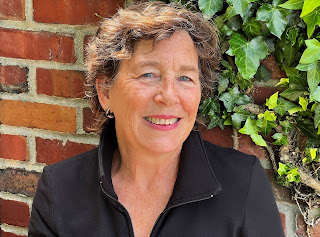Alix Christie is the author of the new novel The Shining Mountains, which was inspired by her own family history. She also has written the novel Guttenberg's Apprentice. Also a journalist and a letterpress printer, she lives in California.
Q: How much did you know about your family history before beginning to write The Shining Mountains, and how did you research the story?
A: I knew my ancestors had worked in the fur trade for the Hudson’s Bay Company but not much more than that.
My brother was the one who ran across Duncan McDonald’s newspaper articles and learned that Duncan’s father was our ancestor’s brother—and that he, like so many of the early European fur traders in North America, had married a Native woman, Catherine Baptiste.
My research really began with the family: I traveled to Montana to meet Angus and Catherine’s descendants. They welcomed me as a distant cousin and supported the project wholeheartedly.
Since I am not Native I consulted extensively with the tribes whose history I was telling, including asking elders in each tribe to read the manuscript. And of course there was a lot of historical reading and research in archives, which contained letters and documents from both Angus and Duncan.
Q: What did you see as the right balance between fiction and history as you wrote the book?
A: My method in this book was similar to how I approached the world of Gutenberg. I’m imagining the lives and feelings of real people who lived in the past. I try to find the story within the actual historical events: what interests me is why these people did the things they did, and how they responded to the larger forces around them.
There’s always a dance between what’s documented and what’s invented and I think the real litmus test is whether or not the characters feel like real people or not. I’m fanatical about accuracy but also know too much reliance on historical fact detracts from the human story.
Q: How was the novel's title chosen, and what does it signify for you?
A: It wasn’t easy to find a good title. The subject matter is hard, often violent, and yet the novel is also a love story. To me their lives are buoyed by their connection to the incredible landscape of the West, which I know well and love.
Early settlers and possibly some Native peoples referred to the Rocky Mountains as the “Shining Mountains” — in fact, in 1947 a play was performed on the reservation where the McDonalds settled in Montana with that same title. It struck me as uplifting, which is how I hope readers feel after spending time with this remarkable and resilient family.
Q: The writer Debra Magpie Earling said of the book, “Humorous and deeply tender, I admire The Shining Mountains for its vivid and emotionally rendered characters, its magnificent landscape, and how Christie captures the extraordinary power of living story.” What do you think of that description, and how important is setting to you in your writing?
A: I’m deeply honored that a writer of her stature appreciated the novel, much of which takes place on Debra’s own Salish tribal homeland.
I was tickled that she found it humorous, because I’ve been really struck by that wry humor I’ve seen in Native stories and people. You hear it in how stories are told, in the past and today—perhaps this is what she means by “living story.” We’re all still part of this country’s living story—it’s ongoing, and I found it really important to try to share this lesser-known part of it.
Q: What are you working on now?
A: I am finishing a family memoir that I hope to be able to talk about soon. Meanwhile I’ve started a new historical novel set in Germany after World War II.
Q: Anything else we should know?
A: Only what Groucho Marx said: “Outside of a dog, a book is man’s best friend. That’s because inside a dog it’s too dark to read.”
--Interview with Deborah Kalb. Here's a previous Q&A with Alix Christie.


No comments:
Post a Comment